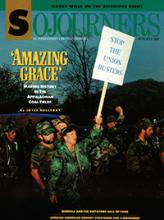Dawn is still an hour away. These mountains are drenched in darkness and the steady cadence of crickets. Fog lies in patches on narrow roads winding through the valleys, thickening to a dense soup at the crests of the ridges, and travel is slow.
From time to time large white tents appear along the road, lit up like ghosts by kerosene lanterns. Men dressed in camouflage outfits huddle in the doorways of makeshift shanties and around fires made in barrels, rubbing their hands and stamping their feet to keep warm. Hand-lettered signs at their feet read "UMWA on strike -- unfair labor practices" and "Gov. Baliles, this is South West Virginia not South Africa." Though these men hold no guns, the scene has the feel of a war zone, an eerie echo of another era.
A century ago the United Mine Workers of America (UMWA) came to birth in these hills, organizing miners who lived in constant danger and grinding poverty while coal barons lined their pockets with wealth robbed from these mountains. "King Coal" fueled the Industrial Revolution, stoking the steel furnaces and locomotive engines that ushered the nation into a new era. And mine workers demanding fair wages, eight-hour days, and safety in the mines were harassed, beaten, evicted from and burned out of their homes, and on some occasions massacred by gun thugs hired by the coal companies.
These hills still echo with their cries and with the labor songs that for a hundred years have rallied and strengthened the miners and their families. These mountain hollows still pay tribute to the determination of generations of everyday heroes, and to the courage of such UMWA legends as John L. Lewis and Mary Harris "Mother" Jones.
Read the Full Article

